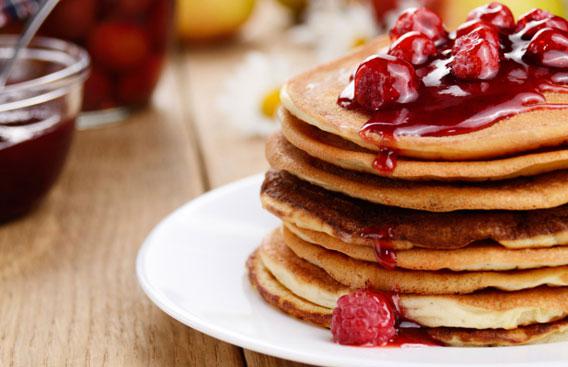Tuesday, Feb. 5 is IHOP’s National Pancake Day. Time magazine celebrated the event with a list of Hollywood’s 10 best breakfast scenes. Why do most Americans eat pancakes only for breakfast?
Because bread is better. Pancakes used to be anytime food in the United States. Around the time of the American Revolution, it was traditional to serve pancakes during dinner—the largest meal of the day, consumed in the early afternoon. But those pancakes were thin, like the French crepe or the Swedish pannkakor, which are still enjoyed at all times of day. In the 1780s, American cooks started adding the chemical leavener pearl ash to their pancake batter. The rising agent transformed the delicate, crepe-like rounds suitable for sopping up the remnants of a meat stew into thick, fluffy, satiating fare, perfect for a filling breakfast. Griddle cakes also had the benefit of speed. While yeast required hours to leaven a dough, chemical agents could produce a thick cake in minutes, enabling frontier cooks to have a bread equivalent on the table before morning farm work began. Scattered advocates notwithstanding, the thicker pancakes never caught on as dinner food. Cooks had hours to prepare the day’s showpiece meal, and colonials preferred yeast leavening to the off-flavor that chemical leavening produced. Even today, people who aren’t used to baking soda say that chemically leavened baked goods have a soapy taste.
Note that Tuesday is National Pancake Day, not International Pancake Day, even though it’s the brainchild of the International House of Pancakes. That’s not an oversight. On the day before Lent begins—when New Orleans erupts for Mardi Gras—many British Commonwealth countries celebrate Shrove Tuesday, also known as pancake day. The tradition helps households use up perishable and Lenten-unfriendly foods like milk and eggs. Hold that “happy pancake day” call to your British friends until next week.
Got a question about today’s news? Ask the Explainer.
Explainer thanks Ken Albala of the University of the Pacific, author of Pancake: A Global History.
